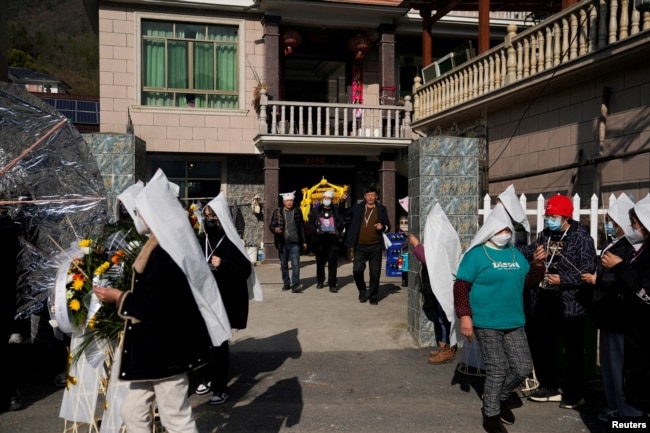WHO, Government Officials Ask China for Better Data Sharing

The World Health Organization and several countries are calling on China to share more data on its COVID-19 outbreak.
At least 10 governments require travelers from China to be tested for the virus. China has criticized the policy, saying it is not science-based and has threatened measures in return.
Officials are especially worried that new variants could be developing in China.
Here is a look at what’s going on with China’s COVID-19 data:
What is China sharing?
Chinese health officials publish a daily count of new cases, severe cases and deaths. The numbers represent officially confirmed cases. China only records deaths from pneumonia or respiratory failure among COVID patients as COVID deaths. In other words, infected people who die without suffering either of those conditions are not counted as COVID deaths.
China is doing COVID sampling studies said Ray Yip, former director of the U.S. Centers for Disease Control office in China. However, Yip said, the government is not sharing its findings.
The Chinese government reported last Thursday a total of 9,548 new COVID infections and five deaths.
But, some local governments are releasing much higher estimates. Zhejiang, a province on the east coast, said Tuesday of last week that it was seeing about 1 million new cases a day.
If a variant appears in an outbreak, it is found through a kind of study known as genetic sequencing.
Since the pandemic started, China has shared 4,144 genetic sequences with GISAID, a global service for coronavirus data. The number represents only 0.04 percent of GISAID’s reported number of cases — a rate more than 100 times lower than that of the United States and almost four times lower than neighboring Mongolia.

Relatives and neighbours attend the funeral of a woman surnamed Liu, as coronavirus disease (COVID-19) outbreak continues, at a village in Tonglu county, Zhejiang province, China, January 9, 2023. (REUTERS/Aly Song)
What is known?
So far, no new variants have shown up in the sequences shared by China. The viruses fueling infections in China are much like those reported in other parts of the world since July, GISAID said.
Dr. Gagandeep Kang, who studies viruses at the Christian Medical College of Vellore in India, agreed. Kang said there was not anything unusually troubling in the data so far.
That has not stopped at least 10 countries — including the U.S., Canada, Japan, South Korea, India, Australia, the U.K., France, Spain and Italy — from announcing virus testing requirements for passengers from China.
The European Union had urged all its member states to take the action.
Health officials have defended the testing as a safety measure to get more data about China’s outbreak. This means countries can seek to identify changes in the virus without China’s help.
“We don’t need China to study that, all we have to do is to test all the people coming out of China,” said Yip, the former public health official.
Canada and Belgium said they will look for virus evidence in wastewater on planes arriving from China.
“It is like an early warning system for authorities to anticipate whether there’s a surge of infections coming in,” said Dr. Khoo Yoong Khean, a scientific director at the Duke-NUS Centre for Outbreak Preparedness in Singapore.
Chinese officials have repeatedly said they are sharing information, pointing to the sequences given to GISAID and meetings with the WHO.
But WHO officials have repeatedly asked for more — not just on genetic sequencing but also on hospitalizations, ICU admissions and deaths. WHO Director-General Tedros Adhanom Ghebreyesus expressed concern this week about the risk to life in China.
“Data remains essential for WHO to carry out regular, rapid and robust risk assessments of the global situation,” the U.N. agency chief said.
Words in This Story
sample v. to test, study, or question (a group of people or things taken from a larger group) to get information
authorities n. plural people who have power to make decisions and enforce rules and laws
anticipate – v. to think of (something that will or might happen in the future)
rapid – adj. happening in a short amount of time : happening quickly
robust – adj. successful or impressive and not likely to fail or weaken
assessment – n. the act of making a judgment about something : the act of assessing something
https://learningenglish.voanews.com/a/who-government-officials-ask-china-for-better-data-sharing/6910922.html